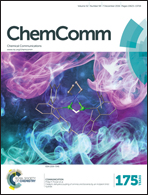Catalytic promiscuity of glycopeptide N-methyltransferases enables bio-orthogonal labelling of biosynthetic intermediates†
Abstract
We show that two α-N-methyltransferases involved in the biosynthesis of glycopeptide antibiotics (GPAs) already recognise partly crosslinked precursor peptides of teicoplanin aglycone indicating that in vivo N-methylation can occur as an early tailoring step during GPA biosynthesis. This relaxed substrate specificity is accompanied by a remarkable promiscuity regarding the co-substrate enabling modulation of biological activity and the introduction of reactive handles which could be further modified using bio-orthogonal chemistry.



 Please wait while we load your content...
Please wait while we load your content...